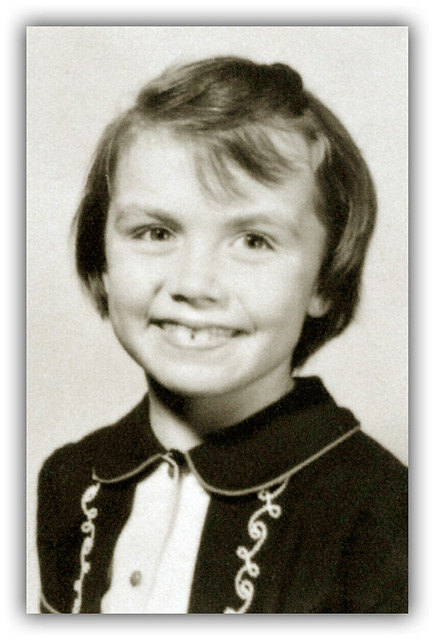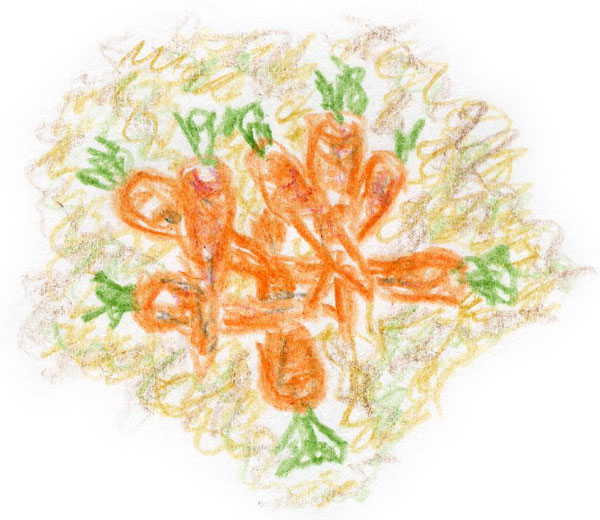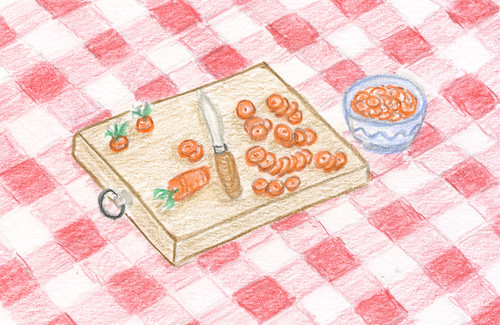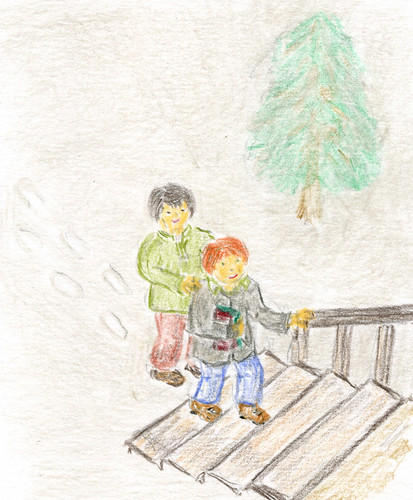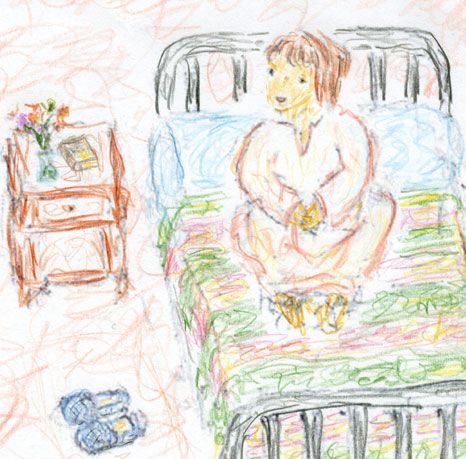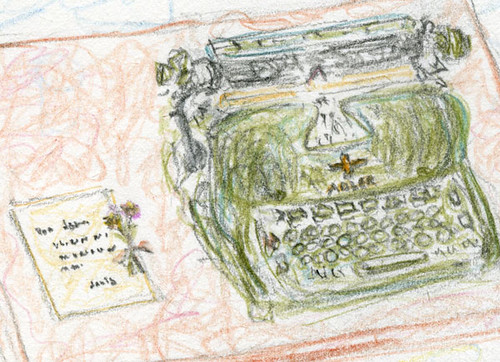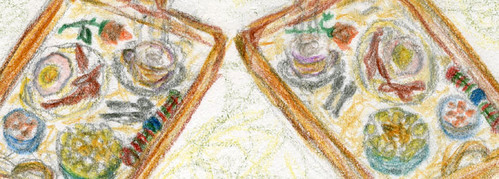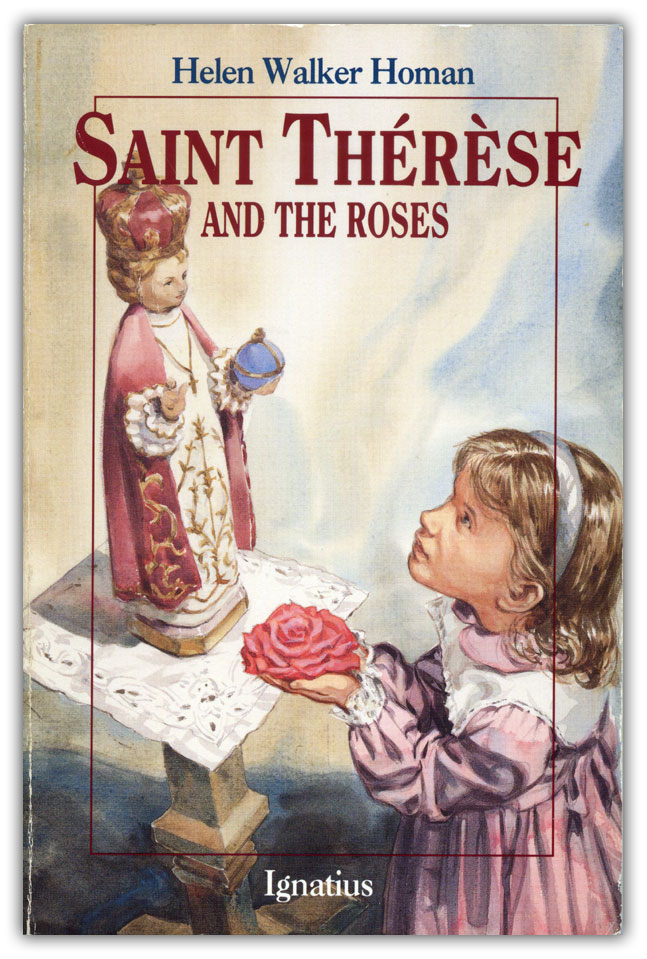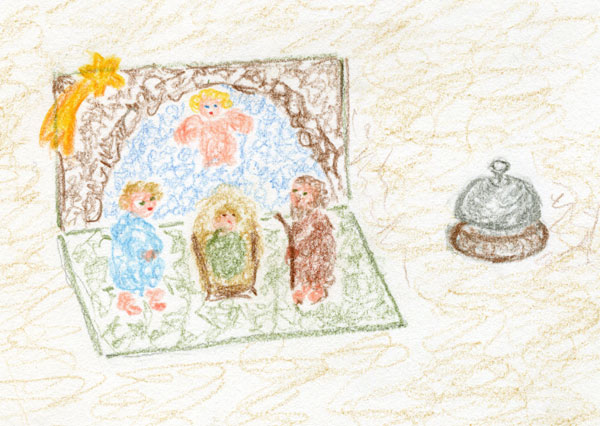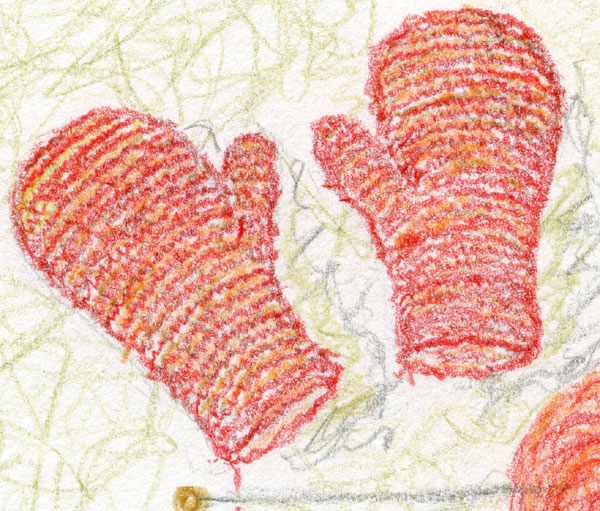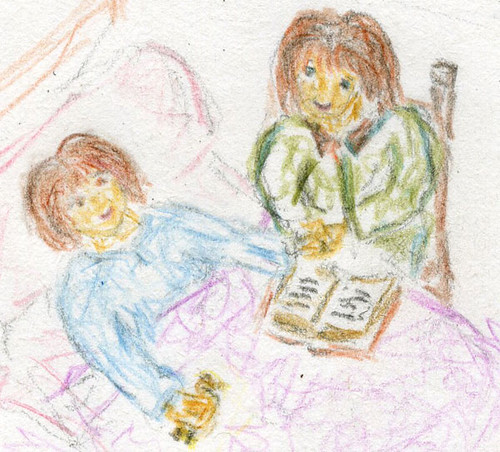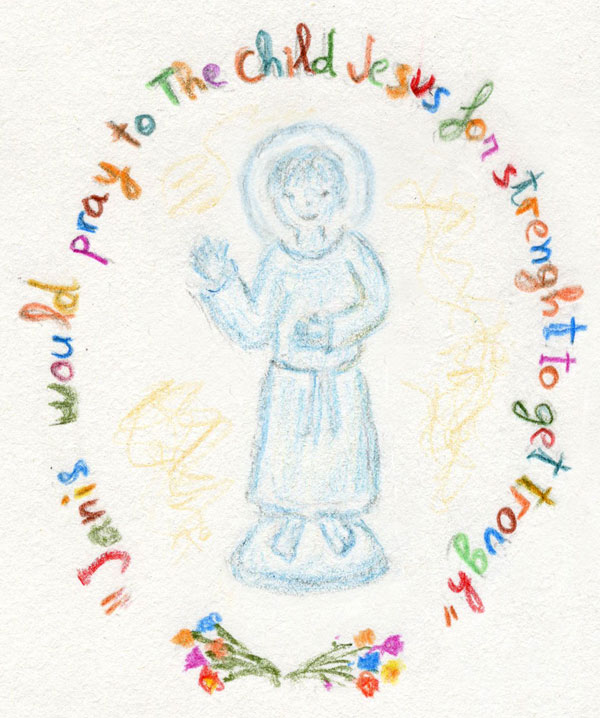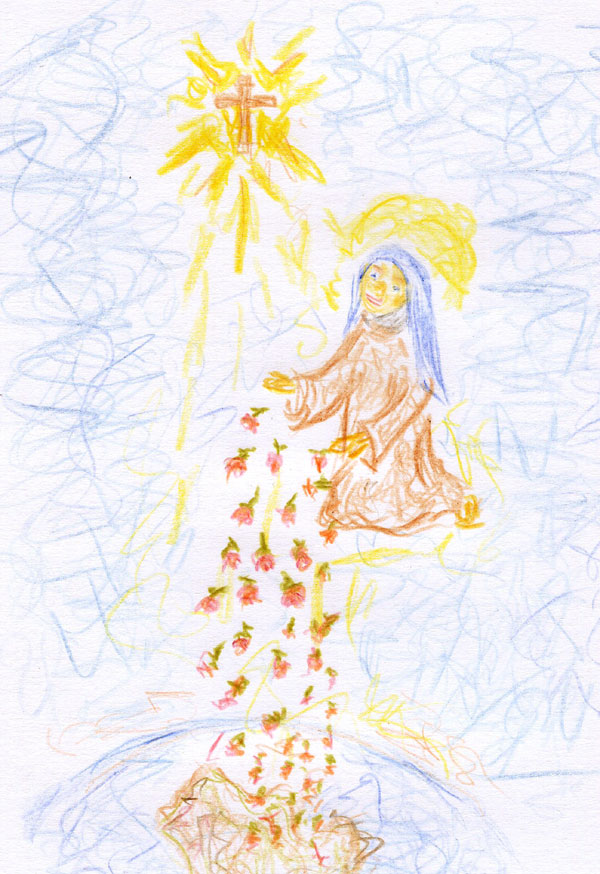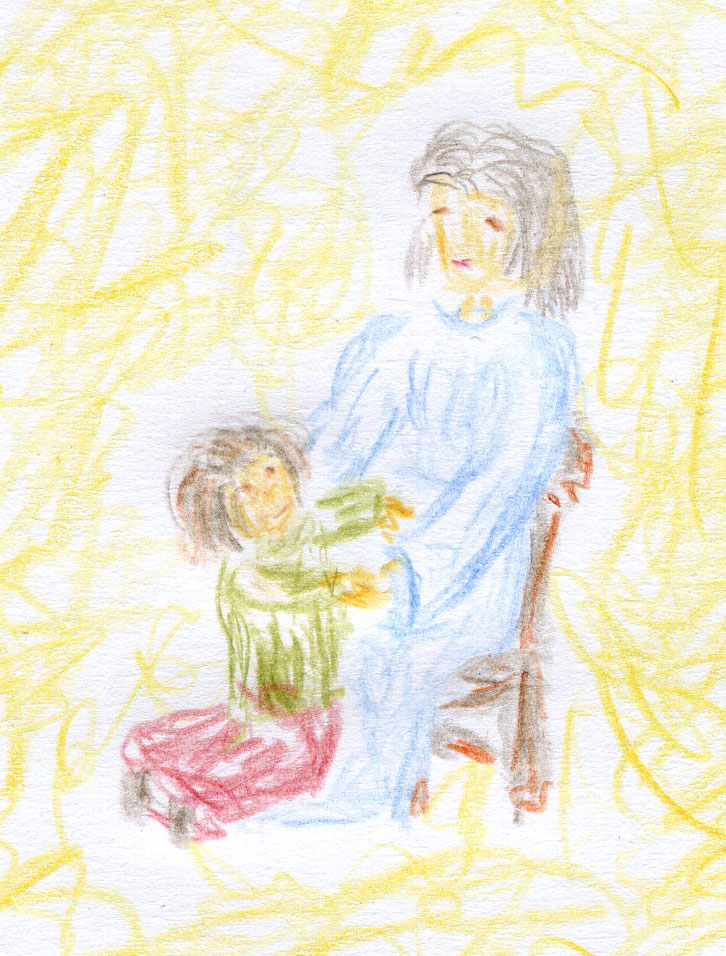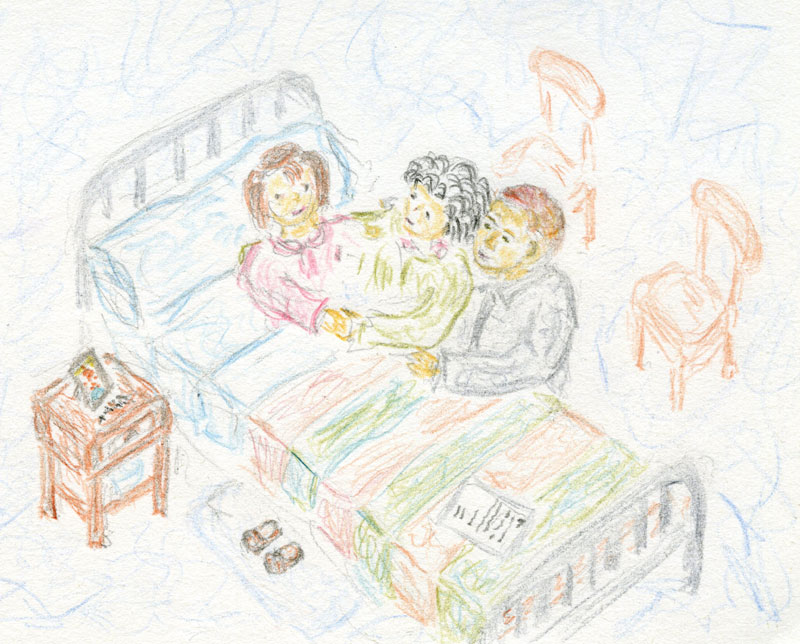1.
Her name is Janis. Janis Babson. She was born in Windsor, Nova Scotia. At the age of two, she and her family went to live in Ottawa. Her father was a member of the Royal Canadian Mounted Police. His name was Rudy. Her mother, who is still alive, is called Rita. What I will explain to you happened in 1960. Janis was the second of six children. She had an older sister, Charmaine, and four younger siblings: Roddy, Karen, Timmy and Sally. The last two were the babies of the house, and Janis called them "the small fry". After Janis’ death another sister was born: Stephany.
Janis liked many things of the kind that you like too. She was a bright and sensitive girl. She specially liked horses, snow, playing with younger children… She often asked her parents to buy a horse. Many afternoons she went to a field near the house and from the fence, she gave carrots to the horses that were there. Her mother had to hide the carrots in the kitchen because, often, Janis took them to the horses and left none for her.
Not far from where she lived, was a school called Saint Nicholas College. It was a school run by nuns. Soon she would start school there. Near her house also lived a girl about her same age, Tricia, who became a good friend.
For Janis, waking up every day was like a gift. Sometimes she told her mother things like "Oh Gosh, Mom, it's great !"... "What's great?” Her mother asked. And Janis answered: "Well... school, snow, playing with children ... You know: Everything!"
Sometimes she would thank God for all the good things in the world. Not that she felt particularly mystical or spiritual. Perhaps she didn't even know the meaning of the word “mystical”. She only felt that God was very close: He was part of her daily life. She spoke to Him and loved Him.
2.
Janis was a charming person, with a great concern for others. Sometimes when she was stirred by a story, she would ask: "Why do people have to be mean to each other? I wish I could be everybody-in-the-world's best friend". She was always kind, graceful and calm in everything she did. That's why this is not a sad story.
I have told you that she was very fond of horses. Every week she waited to watch a television program about horses called National Velvet. When the program ended, she always went to the kitchen where her mother was, and said: "What do you think, mommy, couldn't we find a way to buy a horse? And she always answered no; there were more important things to spend money on. But one afternoon, when the program of the horses had finished, another program started in which they spoke about blind people. Janis was very interested in it. Many of the blind people, said the program, could recover their sight if they could afford a cornea transplant operation. But to perform such operations, they needed people who were willing to donate their eyes to an "Eye Bank" at the time of their death. In the program there was also a young mother who told how she had lost her young son when he was hit by a car. When the accident happened she was desperate, but then, suddenly, she thought that she could donate the eyes of her son and so, somehow, her son would be alive in the world, even in the eyes of another person. She explained with joy in the program how, after doing so, she regained the composure and hope she had lost. Janis was very impressed. She thought for a while and then, resolutely, went to the kitchen. She said to her mother that she wanted to tell her something. Her mother, without looking at her, said: "you want a horse, don’t you?” But Janis told her that, when she died, she would like to donate her eyes to an eye bank. Surprised, her mother answered: "What?" And Janis explained that she had seen a television program in which they spoke of an eye bank to help blind people, and she wanted to help. Her mother gave Janis a lot of carrots and asked her to stay there with her to cut them into small pieces, so, meanwhile, Janis could explain what she had seen in that program. As Rita would realise later, Janis was speaking seriously...
3.
In the month of February it snowed a lot. Janis was excited. She spent long hours in the street playing with the snow. But one day, suddenly and without knowing why, she felt very tired. She did nothing but yawn and had no strength to eat. Her mother thought she could be catching a cold, but she had no appetite at all during the next month. She had lost weight and looked bad.
One day, it was very windy and snowing a lot. When she was returning from school, she felt so weak she could barely move. The wind made her fall. Her older sister, Charmaine, and Roddy, who was younger than her, had already arrived home. Her mother saw through the window how she struggled to walk and, frightened, sent Roddy to help her get home. The boy picked up her books and started to walk in front of her to make a path in the snow. Janis held tightly to Roddy’s jacket and they managed to get home. When she walked in, she slumped on a chair: "I don't know what happened", she said, "I couldn’t go on anymore. I'm so tired ..." Her mother looked at her closely and until then she didn't realized how pale and thin Janis was. Those brown eyes seemed to fill her face.
The next day, her father took her to the doctor. The doctor said, smiling: "Well, young lady? Is this a new way of getting out of school?” Janis made him laugh as she answered immediately: "No. It's a new way my father found to get out of work ..."
After doing a first examination, the doctor sent her to the analyst to do blood tests, and as soon as he had the results he realized that it was a serious thing. The doctor told Janis' father that she probably had leukemia (blood cancer) and that she would be hospitalized the next day...
4.
When Janis' mother told her she would have to go to hospital, she felt very upset. "To hospital?" she said. "I don't want to go to hospital! I'm not sick, I'm just tired... and, besides, I would die there, alone, without you and daddy! Her mother said nothing, and then began to speak softly: "I know how you must be feeling, my daughter, it's difficult for you, for me and for everyone, but we must do what the doctor says, if we want you to get well... We must accept that God sometimes allows evil things, as we accept that he sometimes makes us happy. He knows what is best for each of us, and if you can try to tell Him that you want what he wants, it won't be so difficult. You'll see!" Janis wiped her tears and told her mother she would like to stay a little while alone in the room to think about what she had just said. When she was leaving, her mother saw her praying. After a few minutes she came down and said: "Everything's all right, mommy. I'm ready..."
That night, she was hospitalized and she was in a large room with other children. Her parents went to see her a moment to say goodbye. Then she sat on the bed, with her legs crossed, wearing a white shirt and looking curiously at the other children in the room. When her parents embraced her to say goodbye, she said softly: "you will see me again, right?"
Janis soon made friends with the children there. It was as if the diseases of the other boys and girls always seemed to her more important than her own. As soon as she regained some strength, she ran happily to give her company and her attention now to one, then to another, as if her heart shed joy and hadn't any other choice but to spread it...
She went to encourage small Sue who couldn't stop crying for her mother; she sang together with Jo-Anne; she explained her best stories to the group of children who could not move because of their broken arms, legs and heads, and she put their pillows in place; she took glasses of water to Johnny who kept nagging the nurses, and gave a hand to Paula with her homework. Poor Paula had been staying there for so long that she had lessons from a tutor who came to teach her.
Almost every afternoon Janis' mother went to visit her and, at night, when he could, her father joined them. On these days, two sisters from the school also went to visit her and brought gifts from their classmates, and also a small plastic figure of Baby Jesus and a small photograph, framed, of Saint Therese of Lisieux. These two gifts were very important to Janis for the year and a half she still had to live. Doctors had told her parents she could not live much longer than a year, but they didn't tell her.
A month had passed quickly and, after a few days, since she had got well enough, she was allowed to go back home.
5.
When she came back from hospital, her friend Tricia was waiting outside her home. She ran out of the car: "Tricia!, I'm home!, oh gosh, Trish!" she told her friend as she hugged her. Then she entered home, happy to greet her siblings.
A few special days started for the whole family. Heeding the advice of the doctor, her parents didn’t tell their brothers that Janis had leukemia. They began to spend the remaining time of their life doing the things they’d always said they’d do "someday" but never did. Now, "someday" had arrived, and there were tours by car, games at home in the evening, the visit from Fort William of Janis' grandmother... Meals were also special; now Janis was hungry and ate well. It seemed she was not sick; she played and ran as before.
Every Tuesday morning, however, she had to go to the clinic with her father. She soon made friends with the nurses and the staff of the clinic, and she didn’t forget to visit Freda, who was in charge of the kitchen and the children on the floor where she had been. This was an oncology centre, and people who attended the patients knew which ones had a serious diagnosis. They treated Janis sensitively, and she quickly gained their sympathy. Nobody talked about it, but on Tuesday mornings there was some kind of expectation: all of them were waiting for the moment to see that ray of light arrive, that Janis seemed to be. She went from one place to another, greeting everyone and telling nice things to everyone. One day, one of the nurses, Miss Jessamyn, was not there, so she took the office typewriter and left her this note: "Dear Miss Jessamyn, I am sorry I missed you today. Where were you? Love, Janis."
Another limitation she had to endure was having to eat food without salt. She was very fond of sauces, and foods as spicy snacks or fish ‘n’ chips. One day she improvised these verses for her mother:
"Oh, Mommy, please call a halt / To French fries with no salt!"
She spent the summer as usual. The day she turned 9 ( on September 9th), she was given a bicycle and, excitedly made trips to the surrounding woods. But her health worsened again in October. The doctor did a new blood analysis and prescribed a different medicine. He said she couldn’t do exercise or play with much movement now. It meant a great effort for her, but in this way, slowly, her health improved again
6.
Living more quietly, Janis became more thoughtful and reflective. She spent now many moments reading and had a more stable and peaceful mood. She had always been concerned to please others, but now she was even more eager, and doing so made her happy. Grateful for the company she had received while in the hospital, she wanted to return the attention she had received. When there were no classes, she spent many hours with the “small fry”; she taught them to read and paint, and read them stories. She also had the idea to prepare with them a special breakfast for their parents every Saturday morning.
In this way Janis passed the rest of the course and summer. September came quickly again and a new course began. She was already ten years of age. She was determined to get good marks in math, her hardest subject. She succeeded. She got the highest score in language; her compositions had the same grace and vivacity as her speech.
There was something that really made her suffer: she was not as slim and agile as before. The strong medication she was taking had made her put on weight and her face had darkened. One day a kid in the school said to her: "Hey, fatty, you’d better go on a diet!” She went back home depressed. When she told her mother while wiping away the tears, she hugged her. She didn’t know how to cheer up Janis and asked heaven for help to find the words. Finally, she said, "Do you think it matters so much to God how you look, darling? It's what's inside of you —what you feel. That’s what He cares about.” Janis calmed down, but it was not until the next week that she regained her usual good humor. She went home very happy and her father, while reading the newspaper, said, "What are you doing, young lady?" She replied, with her inimitable grin, "I’m playing hard-to-get. Guess what! Ricky Lewis chased me all the way home from school!” Her joy was back. Later, climbing onto the chair where her father sat reading the paper, poking his stomach, she said to him, "I guess if I don’t watch it I’ll get to be as fat as you, right?” And her father, who had the same sense of humor as Janis, replied, "Who is fat? Let me tell you that everything you see here is sheer muscle!” ...and they laughed together uproariously.
7.
In early December, Janis’ school shared out little boxes of Christmas cards to the students to sell to relatives and friends. The pupil that sold the most boxes would receive a book as a prize. Janis went to the houses in her street trying to sell many postcards in order to win the prize, but as those days she had to spend many hours in the clinic for treatment, she realized that everybody had purchased the cards from the other pupils who went before her. At first she became annoyed because her illness was a disadvantage, but then she came up with an idea to change the situation: she would bring the card boxes to the next visit to the clinic and would try to sell them there. It worked out perfectly. Thanks to the staff, nurses and patients and all of the friends she had there, she sold so many cards that she won the prize by far.
The book she was given, "Saint Therese and the Roses", was a biography of Saint Therese of Lisieux. When Janis was hospitalized – as mentioned above - the nuns gave her a picture of St. Therese and explained things about her life. She kept the picture. If someone ever saw her looking at the picture, she always said she didn’t understand why they had taken a photo of such a happy saint as Therese looking so serious. After a few days she had read the whole book. She liked it a lot and once she told Charmaine that she was her older sister here on earth, but now she also had an older sister in heaven: Therese of Lisieux.
After she got the prize, she gratefully built a cardboard nativity scene with figurines in cotton and then took it to Children's Hospital Plant. She said to the nurse at the counter: "Would you have room for them?" The nurse, thrilled, said: "Why, we’ll give them a place of honor!" She wiped a corner of the counter and, ceremoniously, placed there Janis’ nativity.
During Christmas time, Janis’ health became worse. In the middle of January she was hospitalized again. By increasing the dose of medicine she was taking, soon she could get better. When she was able to walk again, she started giving her help to the children on the plant. One day, after having spent all night keeping company to Donna, a three-year-old girl who had been hit by a car, the nurses appointed her as an "official, unofficial nurse assistant"
That time, she stayed in the hospital only a bit longer than a week.
8.
Janis came back home in the middle of February, but she could not go to school anymore because the doctor said it wouldn’t be good for her. These days you could see her sitting near the dining-room window, reading a book, knitting mittens for her little sister Sally, or simply looking over by the window, waiting to see their brothers and sisters coming down the road from school. Sometimes she would ask her mother to stay a while keeping her company, and would beg her to tell things. She liked to listen, again and again, the story of how she and her father had met and about when they married. Afterwards, later, perhaps some friends of school would come to visit her. She tried to be cheerful, entertaining them with her conversation; once, her mother had heard one of them, with tears from laughing so much, begging Janis to stop joking...
Those days, her backache was almost constant. She didn’t complain or say anything about it, but sometimes, a strong spasm betrayed her and, in the silence of the night you could hear a sharp cry she hadn’t been able to control.
In mid-March she was hospitalized once more. She couldn’t stand and had to stay in bed all the time. She was treated with radiation therapy to try to stop the disease from progressing. She was cheerful and never gave up, but one day in the evening, when her parents went to visit her, they found her asleep. The notebook had fallen to the ground and lay face down. When they picked it up they read what she had written:
"At this moment I am crying for my dear, dear, dear mother and father as I am homesick in this hospital. I don't think I shall ever let myself think anything mean about them again in my life as right now I see how much I love them"
With a heavy heart, leaving the notebook again, they tiptoed out and went to see Janis’ doctor, Dr. English. They suggested a plan: if he gave them permission to take Janis home, they would follow to the dot the instructions he gave them and they would take her to hospital as often as necessary... He agreed. "It’s getting late, isn’t it? There isn’t very much more we can do” he said to them slowly. That doctor loved Janis very much; both had become good comrades.
9.
On the way back from hospital, when the driver of the ambulance turned into the street where they lived, he made the siren blow until they arrived home and told Janis he had done it just to warn everybody she was back…
Janis asked her parents to move the bed beside the window. Charmaine and Rudy had painted a large welcome sign and had hung it on the headboard.
Now Janis could barely read. She could still sit for a while and liked to look out the window. The pain almost didn't cease and Janis always kept in her hands the figurine of Child Jesus that the nuns of the school had given her. The diseased cells had arrived to her head; she had tooth ache and she got dizzy.
On May 4th she worsened and there was no alternative but to take her again to the hospital. While they were waiting for the ambulance, her sister Charmaine read jokes for her. In this way she could forget the pain and Charmaine even made her laugh.
The next day, when her mother went to the hospital, Janis was radiant.
-"Mommy, you know what"? She said as she turned up.
-"No; what?"
-"I received another sacrament last night"
- "What do you mean..? You..."
- "Yes. I was administered the Extreme Unction"! (At that time, the "Anointing of the Sick" was called "Extreme Unction")
- “Father Joanisse paid me for a visit and explained me that the Extreme Unction is very important to get ready in case I die, to help me to become good. It was very beautiful! First he said some prayers and then we both said the Confiteor together. Afterwards he drew me a small cross with oil on my eyes, ears and lips, and on my hands and feet, and asked God to forgive all the my sins. I feel so well!”
Afterwards, when her father arrived, she asked them to make a will. "People make their will before they die" she suggested with calm. "I would like to make mine, just on the off chance…"
She asked them so convinced and calmly that they could only take her word for it. His father took paper and pencil and, as if he was a notary, with an official air, kept on noting fast everything she suggested: "The new bicycle for Charmaine, the watercolours for Roddy, the dolls for Karen, and the other toys for Timmy and Sally. The book of prayers and savings are for you daddy, and the jewellery box and toilet water for you, mommy." When she had ended, opening her eyes wide and shaking a finger, she added: "And, don’t forget, you have to donate my eyes to an eye bank!"
Afterwards, smiling, she said to them: "Even if I’ve been anointed and made my will, that doesn’t mean I’m going to die. I’m still asking Dear God to heal me"
10.
Janis wasn’t constantly happy and serene. She had some spasms that lasted a long time and they made her suffer very much. It was then that she held firmly in her hand the figurine of the Child Jesus. But when she had good moments and felt better, her usual optimism came back and she thought that maybe she was already recovering her health completely.
«the little statue......it was white and about 3" in height, and she carried it in her hand and would always hold it tightly when she was having anextremely painfall bone marrow test. She would pray to The Child Jesus for strength to get through it» (Charmaine)
One day, when she was brought her lunch, she had a surprise that made her very happy. Inside the napkin she found a note written with big letters: "I LOVE YOU" and, below, a boy of the next ward had written his name. He was a boy who came to see her every day and they gave encouragement to one another. That note thrilled her. As soon as her parents went there in the afternoon she explained to them: “This boy, does as you say, Mommy: he doesn’t like me because of my looks, so he must like me for who I am. He must be a very good boy”
As the days passed, the spasms were more continuous and more intense. She didn’t know what to think. If God had wanted to heal her, why was she getting worse? She wanted to know if God would to take her to Heaven or not...
After such a long illness, and having undergone so many visits and medical tests, Janis, who just was a girl of ten years and a half of age, still didn’t know that she had leukemia. It was not until the day after the napkin note that she found out. A young doctor and a nurse who was in practice entered the room. The doctor said to Janis: "And what’s wrong with you, my pretty?" The nurse, looking at the chart book, suggested immediately: "she has leukemia". The young doctor stared at the nurse seriously, but what she had said could not be undone.
When her mother arrived in the afternoon, Janis said her: "I have leukemia, haven’t I?”. As it took her by surprise, she took a little while to answer. She had never lied to her and neither would she do it now. She said: "How would you feel, if you had leukemia? Would it frighten you?”. Janis shook her head. “If that’s what I have, it’s because God thinks I should have it. What is there to be afraid of? And anyway, if He wanted, He could still cure me” Then, her mother took her hand-bag, and handing Janis the small framed picture of Saint Therese of Lisieux, she said: "It’s high time your big sister paid you a visit”. Earlier, at home, she had changed Saint Therese’ picture. Instead of the one in which the saint looked sad, she had changed it to one in which the saint was smiling. In the picture, Saint Therese was in Heaven, and a huge shower of roses was falling from her hands to the world. Thrilled, kissing the picture, Janis said: "Mommy, that’s the sign! My big sister has seen it! See those roses, a whole shower of them? That is the sign. Now I know I will not be cured. Dear God is going to come for me"
11.
From that moment Janis didn’t talk anymore about being cured. Now she talked about Heaven. Let me copy a whole paragraph from the book of Sister Mary Rose (Rena Ray). It is from May 9, three days before her death:
«"The first thing I’ll do when I arrive to the heaven is to run to our Blessed Lady and bury my head in her lap. Then I’ll ask her to console you and take good care of all the family”, Janis said this as if she were planning a wonderful trip...
»Then, noticing tears in her mother’s eyes, she felt displeased.
»"I don’t want you to cry about me, Mommy. I don’t want anyone to be unhappy because it will only spoil my happiness."»
In the next day morning, at a time when she was better, Janis said to her mother to ask a little girl in the room to sing a song. The little girl, who had a very good voice, asked them what song would they like to hear, and Janis told her mother: «Something happy. Does she know "Old McDonald Had a Farm?" That’s a happy song». Later, from the room was heard the music from a radio that someone was listening in the corridor. It sounded quite loud and a passing nurse came in to ask if they wanted to lower the volume. Her mother said yes, but Janis said no, shaking her head. With a muffled voice said, "I love it" and tried to keep the rhythm with her feet. Then, with her usual affection, added: "if not for these damn sheets, so tight, I could still dance."
Her father stayed up all night with her. At dawn, before her mother could enter the room, a nurse who clearly had been crying, stopped her and said: “please, tell her how nice she looks !” “She wanted us to get her ready..." They bathed her and combed her hair, then she asked them to dress her with the new nightgown she had received recently, one that was pink with tiny white flowers. When she entered the room, her mother said: "Oh, you look lovely...!" Janis smiled. She was awake, but tired. "Now I'm about," she said. She lost consciousness, woke up, fell back asleep... At one moment she woke up and asked her parents if they could weigh her when she died. "If I go to Heaven, I wonder if I will be as I've always been: nice and thin..." Her mother replied: "Janis, sweetie, your body is just a dress, don’t you remember?" Janis laughed: "It’s true", she said, “I'm getting older and I lose my head..."
In the afternoon, there was a moment in which she seemed to wake from a nightmare and told her father in a clear voice: "Daddy !, have you made the arrangements with the Eye Bank?" He had to admit that he had not. "You promised you would. I want you to do it... please!"
Her father went to fetch a nurse and asked her if she knew what he had to do for the donation of eyes. The nurse called Dr. English and soon they left the form ready. Once Janis knew this was done she rested quietly. “Thank you, Daddy. Now you’ve made me happy”, she said.
About eight o'clock in the evening her mother realized she wouldn’t last much longer. She told her, "Janis, when Dear God comes for you, if you know it, make sure to tell us. We want to say goodbye!”
«Twenty minutes later—I copy from the book of Sister Mary Rose (Rena Ray)—, Janis stirred gently and opened her eyes. They became exceedingly large and lustrous as if she were beholding some splendor. Her face broke in a radiant smile that was breath-taking in its beauty.
»”Is this Heaven?" she asked, and seemed to be drifting away. Then a worried expression replaced the splendor. She looked directly at her father and mother. Beckoning to them she called urgently: “Mommy... Daddy !... come... quick !”
»In an instant both her parents were enclosed in her last embrace. Her eyes slowly closed. It was then that Janis breathed forth her beautiful soul to God. »It was 9:25 pm o’clock, Friday, May 12th, 1961, and Janis was in her eleventh year.»
-------
The text is drawn from the Information contained in the books of authors Lawrence Elliott ("The Triumph of Janis Babson") and Rena Ray --a pseudonym used by Sister Mary Rose, of the Sisters of Holy Cross-- ("Janis of City View"). Bob Minder was kind enough to send copies --in a beautiful green folder-- of the original publications of these books to many people. Mingu, with the corrections made by his son Nico, Pil Rossinyol and her friend Sally, drafted this pitiful English translation from a previous Catalan summary version (with the corrections gently made by Maria M. and Pilar Torra).
We emphasize our respect and gratitude to Janis' family and Bob Minder, and our acknowledgment to the authors of the great original books, Sister Irene Primeau (Rena Ray) and Lawrence Elliott. Broadly, we have not followed to the dot the texts to avoid violating copyrights. Please forgive our poor English and language mistakes: we would appreciate your corrections, which can be sent to janisbabsonfriends@gmail.com
